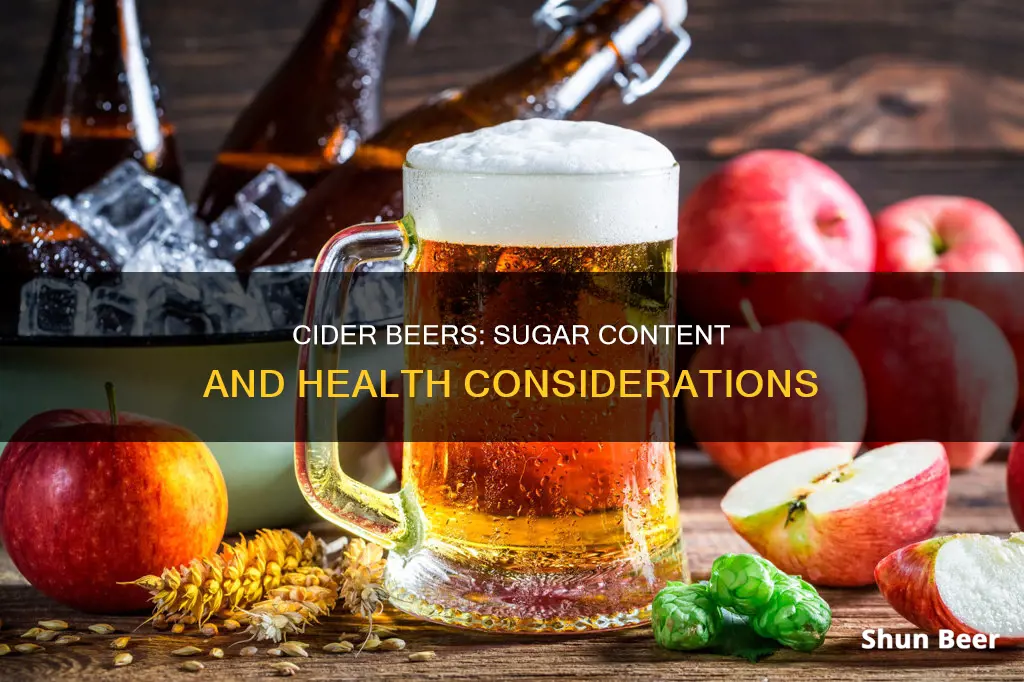
Cider is a popular alcoholic drink, especially in the UK, where nearly 40% of the world's cider is consumed. But how much sugar does it contain? A pint of cider contains almost as much sugar as the World Health Organisation (WHO) recommends a person should have in a whole day. The WHO suggests that a person's daily intake of added sugar should be halved to six teaspoons to avoid health problems such as obesity and tooth decay. Cider can be high in sugar because the fruit it contains is naturally full of it. Commercial ciders also tend to add extra sugar to appeal to sweeter palettes. The sugar content varies depending on the brand and the type of cider, with dryer ciders allowing the yeast to consume more of the cider's natural sugars, resulting in a less sweet drink.
| Characteristics | Values |
|---|---|
| Sugar content | Cider has a higher sugar content than beer. The sugar content of cider varies depending on the brand and the fermentation process used. For example, Rekorderlig Wild Berries contains 48g of sugar per pint, while Stowford Press contains 6g of sugar per pint. |
| Calories | Cider and beer have a similar number of calories, at around 200 per bottle or pint. |
| Carbohydrates | Cider typically has more carbohydrates than beer due to its higher sugar content. |
| Gluten | Cider is gluten-free, whereas most beers are not. |
| Vitamins and minerals | Cider contains pectin, B vitamins, biotin, folic acid, and vitamin C. Beer contains magnesium, potassium, and B vitamins. |
| Antioxidants | Cider contains polyphenols and flavonoids, which are types of antioxidants. Beer also contains antioxidants, including flavonoids. |
| Health benefits | Both cider and beer have potential health benefits when consumed in moderation. Cider contains polyphenols, which can improve blood pressure and cholesterol. Beer may help with digestion, although it can also cause gas and bloating. |
What You'll Learn

Cider is made from fermenting fruit with sugar and yeast, often apples
Cider is a refreshing beverage that is made through the fermentation of fruit, sugar, and yeast. The most commonly used fruit in cider is apples, which provide antioxidants like vitamin C. The process of making cider is quite similar to winemaking, and involves several steps.
First, apples are carefully selected and blended to achieve a balance of sweetness and tartness. Different varieties of apples will result in different flavours of cider. For instance, Cortland, Golden Delicious, and Gala apples are used for sweet cider, while McIntosh, Braeburn, and Jonathan apples are preferred for a tarter cider.
Next, the apples are washed and crushed to release their juice. The juice is then strained to remove solids, but it is not filtered, resulting in a cloudy appearance. Some cider makers choose to pasteurize the cider at this stage to extend its shelf life, while others prefer to keep it unpasteurized for a more natural taste.
The juice is then combined with sugar and yeast to begin the fermentation process. During fermentation, the yeast consumes the sugar in the apple juice, converting it into alcohol and carbon dioxide. This process can take anywhere from a couple of weeks to several months, depending on the type of yeast used and the desired sweetness of the cider.
Finally, the cider is bottled and can be enjoyed still or sparkling. If a sparkling cider is desired, priming sugar is added before bottling, and the cider is aged and conditioned in the bottle for about two to three weeks. For still cider, no priming sugar is added, and it can be consumed right away or aged for a few weeks to develop additional flavours.
Cider offers several health benefits due to its nutrient-rich content. It contains pectin, B vitamins, biotin, and folic acid. Additionally, the apples used in cider provide vitamin C and antioxidants like polyphenols and flavonoids, which give cider its distinctive colour. These antioxidants have been linked to potential health benefits, including protection against certain types of cancer and improved heart health.
While cider does contain sugar, the amount varies depending on the fermentation process and the type of cider. Sweeter ciders are slowly fermented, and the yeast does not consume all the natural sugars, resulting in a higher sugar content. On the other hand, dryer ciders allow the yeast to consume most of the natural sugars, leading to a less sweet drink with a higher alcohol content.
Coke vs Beer: Which Drink Contains More Sugar?
You may want to see also

Cider is gluten-free, unlike beer
Cider and beer are not usually the first drinks that come to mind when considering healthy beverage options. However, some research indicates that drinking certain types of cider and beer can minimise the impacts of alcohol on the body.
Cider is made by fermenting fruit with sugar, yeast and, often, apples, which provide antioxidants like vitamin C. Because it is fruit-based, cider has the advantage of being gluten-free, which beer is not. Beer is made with yeast, hops, water, and cereals, and most varieties contain gluten, which is found in wheat or barley.
Cider is a great option for beer lovers who are unable to drink beer due to gluten allergies or celiac disease. Unlike beer, cider is gluten-free because it is made from fresh apples, which are inherently gluten-free. In addition, because ciders do not use wheat or barley, they are naturally gluten-free.
While cider and beer have similar calorie counts, with a bottle of each containing around 200 calories, cider is typically higher in carbohydrates and sugar. Beer is sugar-free, while cider can be quite high in sugar because the fruit it contains is naturally full of it. The sugar content of cider also varies depending on the fermentation process used. For sweeter ciders, the yeast is strained to remove it from the juice, leaving more sugar in the cider. For dryer ciders, the yeast is left to consume nearly all of the sugar in the juice, resulting in a less sweet cider with a higher alcohol content.
When it comes to health, the main difference between beer and cider lies in their sugar and carb content. Beer has the advantage of being lower in sugar and carbs, while cider has the benefit of being gluten-free.
Beer and Blood Sugar: What's the Connection?
You may want to see also

Cider has more sugar than beer
Commercial cider brands tend to add extra sugar to their products to appeal to consumers with a sweet tooth. For example, a pint of Rekorderlig Wild Berries cider contains 48 grams of sugar, which is more than a can of Coke and almost double the amount in a Creme Egg. A bottle of Bulmers Original, a cider, contains 20.5 grams of sugar, or five teaspoons, in a 568ml bottle, which is the same size as a pint. By contrast, a pint of Stowford Press, a type of cider, contains only 6 grams of sugar.
The World Health Organization (WHO) recommends that an average person's daily limit of added sugar should be six teaspoons. A single pint of cider contains almost as much sugar as the WHO recommends as a person's daily limit. Wines and beers contain significantly smaller amounts of sugar than cider.
Beer is made from water, wheat or barley, fermenting yeast, and flavouring agents like hops. Cider, on the other hand, is made from fresh apples, which are inherently gluten-free.
Best Low-Sugar Beers: The Sweetness Spectrum
You may want to see also

Cider has more calories than beer
The sugar content of cider depends on the type of fruit used and the fermentation process. For example, sweet ciders are made by straining the juice to remove yeast, leaving more sugar, while dry ciders allow yeast to consume most of the sugar, resulting in a less sweet, higher-alcohol drink. The fruit used to make cider is naturally high in sugar, which is why cider contains more sugar and calories than beer.
The amount of sugar in cider can vary widely depending on the brand and production method. For instance, Rekorderlig Wild Berries cider contains 48 grams of sugar per pint, which is more than a can of Coke. In contrast, a pint of Stowford Press cider contains only 6 grams of sugar.
Commercial ciders often add extra sugar to appeal to consumers with a sweet tooth. Magners and Kopparberg, for example, contain more sugar and carbs than beer. However, fully fermented dry ciders contain no sugar at all, as the yeast consumes all the sugar during fermentation.
While beer is typically lower in sugar and calories than cider, it still provides a good source of antioxidants and nutrients like vitamin B, potassium, and folate. Both beverages contain similar amounts of calories, with an average of around 200 calories per bottle. However, due to the higher sugar content, ciders tend to be higher in carbohydrates, and the lack of "light" options for cider means they are usually slightly higher in calories and carbs than beer.
Sour Beers: High Sugar Content or Healthy Choice?
You may want to see also

Sweeter ciders are slowly fermented
The amount of sugar in cider can vary depending on the specific type of cider and the fermentation process used. Sweeter ciders, for example, are produced by slowing down the fermentation process. This allows the yeast to feed on the cider's natural sugars at a slower rate, resulting in a drink that retains more of its natural sweetness.
During the fermentation process, the yeast consumes the cider's natural sugars and converts them into alcohol. In sweeter ciders, the slower fermentation rate gives the yeast more time to feed on the sugars, resulting in a lower alcohol content compared to dryer ciders.
To create an even sweeter cider, additional sugar or honey can be added during the fermentation process. However, it is important to note that while this increases the alcohol content, it does not make the cider taste sweeter. Instead, it enhances the dryness of the cider and may make it taste more like burning alcohol.
The sugar content of cider also depends on the type of apples used. Different apple varieties have varying levels of polyphenols, which are natural compounds that offer health benefits such as improved blood pressure and cholesterol. The specific apples used can significantly impact the antioxidant content and, consequently, the potential health benefits of the cider.
Commercial ciders often add extra sugar to appeal to consumers with a sweet palate. As a result, these ciders tend to have higher sugar and carbohydrate content than dryer, less sweetened ciders.
Beer's Sweet Secret: Sugar Content Explored
You may want to see also
Frequently asked questions
Yes, cider beers can contain a lot of sugar. The sugar content depends on the style of cider. Commercial ciders tend to have added sugar to appeal to sweeter palettes, whereas fully fermented dry ciders contain no sugar at all. The most popular brands of hard cider have a wide range of sugar content, from 10 grams per serving to 25 grams per serving.
A pint of cider can contain almost as much sugar as the World Health Organisation recommends is the daily limit for an average person. A bottle of Bulmers Original cider, for example, contains 20.5g of sugar in a 568ml bottle (the size of a pint).
Bulmers Toffee Apple has the most sugar, with 12.1g of sugar per 100ml. This amounts to 61g of sugar in a 500ml bottle, which is over double the recommended amount of free daily sugars.
Stowford Press has the least sugar, with 1g of sugar per 100ml. A pint will only have 6g of sugar, which is 18% of the recommended amount of free daily sugars.







